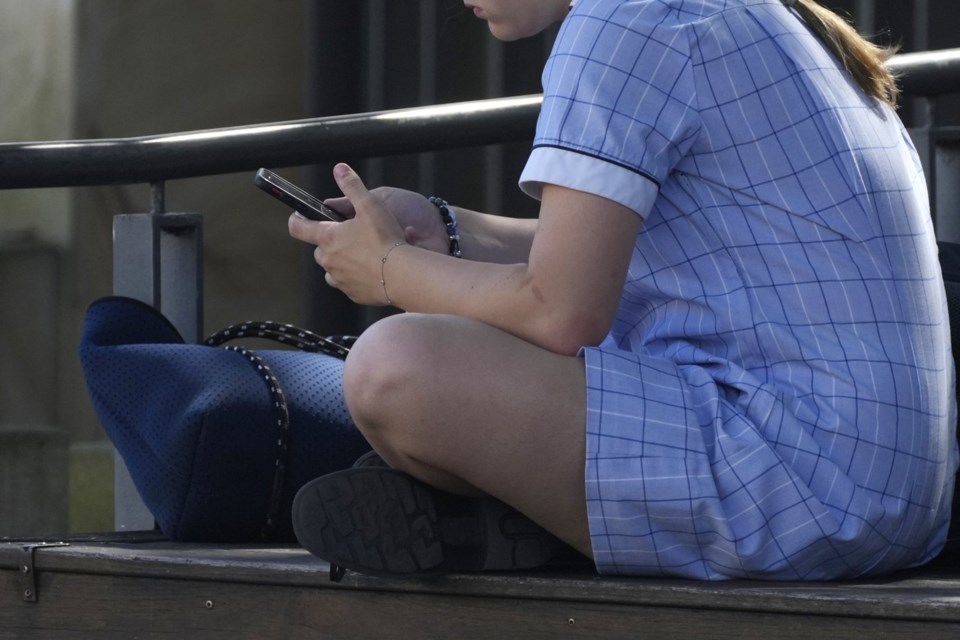TORONTO — A new law in Australia is poised to ban social media platforms from offering profiles to teens 16 and under, but some experts are calling the measure misguided.
The legislation passed this week is meant to protect young people from the potential mental-health harms of social media use, but those who study the issue say it's not quite so simple as kicking kids off the apps.
"It seems very much like bringing a hammer to a problem that requires a scalpel," said Bree McEwan, a professor at the University of Toronto who studies social media and relationships.
What do we know about the effects of social media on teens?
There's a lot of worry around how social media is affecting teens' mental health, but McEwan said the danger has been somewhat overstated.
She co-authored a 2022 paper published in the Journal of Social and Personal Relationships that reviewed more than 360 studies on social media (or "computer-mediated communication") and well-being. The researchers found that, like most things, the issue is nuanced.
"There's a couple big splashy studies that (show) very small negative effects, but most studies, either there was no finding or there were small positive effects (or) small negative effects," McEwan said.
"And we do have quite a bit of research that there are certain functions for teens that are really useful to have social media."
Young people who are isolated or marginalized, such as those who are LGBTQ+ or members of racial minorities, can find great value in online communities. Likewise, McEwan said, social media helped combat loneliness during the pandemic.
In terms of the negative effects of social media on teens' well-being, it's mostly to do with "upward social comparison: Looking at people's feeds that look like this amazing life, and then comparing your own life and going, 'my life's not that amazing all of the time,'" McEwan said.
Some of the studies that found social media had negative effects were specifically looking at "problematic or compulsive internet use," which may not reflect how most teens engage with the apps.
What is the situation in Canada?
Platforms like Facebook, TikTok and Snapchat all require users to be at least 13 years old, but McEwan said kids can — and do — easily get around that by lying about their year of birth when they sign up for an account.
Instagram, meanwhile, rolled out "Teen Accounts" in some markets, including Canada. The accounts come with special settings, including defaulting profiles to private, restricting who can message, tag and mention the young users, and issuing a reminder to close the app after they've spent an hour on it each day.
But these policies aren't mandated. Australia's law is a world first, so there's no blanket ban like that in this country. But some school boards have moved to ban social media platforms on their wi-fi networks, and several provinces have banned the use of cellphones in classrooms.
McEwan said banning cellphones in certain environments is quite different from banning social media.
"I don't see any problem with saying you have to leave your phone in your locker and concentrate on this particular task," she said. "In fact, I think that's teaching good device habits. Sometimes we use it and sometimes we don't."
But banning social media on school networks is a bit different, McEwan said. It prevents students from building those good habits, and in some cases has stymied how they're able to relate to one another.
"You're taking away the ability to use those channels as official channels for the school, for student groups, to advertise plays and things like that," she said. "Then it starts being like, what are you really accomplishing here?"
Not everyone agrees.
The youth wing of the governing Coalition Avenir Quebec is pushing for her province to follow Australia's lead. Twenty-two-year-old Aurélie Diep, who heads up the youth wing, said she believes social media is contributing to poor concentration and lost sleep among her peers. She even experiences it herself.
“In the evening, before I go to bed, I say to myself, ‘one last look at Instagram and then I’m going to bed,’” she said. “And then I might spend an hour on it.”
What might happen if teens are banned from social media?
Kate Maddalena, a media theory professor at U of T, said she's of two minds about a ban.
"I'm glad that national governments are standing up to huge platform. I'm glad they're putting pressure on platforms to take accountability for the harms that social media platforms do to young people," she said.
"But I don't think that legislating an age or access to social media is actually really substantively benefiting anyone that the legislation purports to protect."
The law will make platforms including TikTok, Facebook, Snapchat, Reddit, X and Instagram liable for fines of up to 50 million Australian dollars, roughly $45 million, for systemic failures to prevent children younger than 16 from holding accounts.
The platforms have one year to work out how they could implement the ban before penalties are enforced.
Maddalena said enforcing such a ban will be difficult, and could have ripple effects.
"When you ban something, it goes underground, and then when it's underground, it becomes both attractive and also undiscussable," she said.
"I'm much more interested in making these technologies the topics of discussion."
-with files from The Associated Press and Maura Forrest in Montreal.
This report by The Canadian Press was first published Dec. 2, 2024.
Nicole Thompson, The Canadian Press




